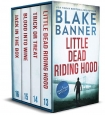Unknown 9, Layton Green [good books to read for 12 year olds txt] 📗

- Author: Layton Green
Book online «Unknown 9, Layton Green [good books to read for 12 year olds txt] 📗». Author Layton Green
Though poverty was rampant, the energy was electric, intense, pulsating. The city felt as if it were moving in fast-forward, the fervor of life on the margins in a burgeoning economy.
On the way through town, the bus slowed to a crawl, adding passengers until it was so packed Andie felt as if she could barely breathe. Across the aisle, Cal was squeezed between a businessman in a tailored suit and an attractive, petite Vietnamese woman in workout clothes, her bosom pressing against a sports bra.
I’m sure Cal doesn’t mind, she thought, then frowned at the twinge of jealousy it produced.
Darsha had never asked Andie or Cal where they wanted to go in Hanoi. She knew the score. They were on their own.
Cal caught her eye and mouthed, Where to?
Good question, she mouthed back.
She made her way to the front and tried to speak to the driver, but he didn’t understand a word of English. At a loss, she and Cal jumped off in a section of the city somewhat less insane than the rest, filled with crumbling buildings with romantic wrought-iron balconies on the upper stories. Commerce of some form or another crammed both sides of the road. She gawked at the explosion of tiny stalls, chic cafés, restaurants, bakeries, bespoke tailors, and neon signs.
“I’m starving,” Cal said. “And fiending for some caffeine. Let’s duck into one of these cafés.”
She agreed. As mosquitos flitted about her face, her back dripping with sweat, they stepped into a bakery with a pleasing array of pastries in glass cases. The AC was a godsend. After opting for the daily special, banh mi with shredded pork, they carried their iced coffees to an upstairs seating area with a large window overlooking the street. Though relieved to be on their own, they were in an utterly foreign place with no idea of where to go next or what to do. They didn’t even know which part of the city they were in. While they might have a little bit of time without the Ascendants breathing down their necks, they didn’t just have to figure out the next clue—they had to snatch the Star Phone from the hands of the enemy.
A task which, at the moment, seemed impossible.
One step at a time, Andie.
There were no other customers upstairs, allowing them to talk freely. She glanced out the window. “We might as well search in here. It’s a sauna outside.”
“What’s the humidity, two thousand percent?” Cal said. “And why is everyone walking around in designer jeans in this heat?”
“Slaves to fashion,” she muttered. After powering up the phone, she and Cal leaned in to view a map of the city. “We’re right in the middle of downtown,” she said, “in a section called the French Quarter.”
“I should hope we’re in the middle of downtown,” Cal said, glancing at the crush of people in the street. Most of the traffic had stopped for a red light—a rare occurrence—and when the light turned green, the cars and motorbikes in front shot forward like it was the Indy 500. “This place is nuts. It’s like a Left Bank in the jungle, with no rules and ten times the population.” He leaned back. “So tell me more about the Silk Road.”
“For starters, it wasn’t really a road. It was a collection of land and sea trade routes spanning over four thousand miles, from eastern Europe to China. Imagine the largest bazaar you can think of in perpetual motion, moving by boat and camel and yak and horse, carrying everything under the sun in the ancient world: textiles, spices, porcelain, precious stones, wine, perfume, ivory, furs, slaves, animals—you name it.”
Cal looked thoughtful. “How long did it last?”
“Rough guess? Third-century BCE to the fourteen hundreds or so. Not long after Marco Polo’s day.”
“I always thought he discovered it.”
“He just wrote a book about it,” she said, “which exposed the West to these cultures and made him famous. It’s been a while since I’ve studied it, but I know historians consider the flow of ideas along the Silk Road even more impactful than the physical goods.”
“Such as?” Cal said.
“Philosophies and religions, and I’m talking the big ones: Christianity, Buddhism, Zoroastrianism, Islam. China gave the West papermaking, printing, gunpowder, and the compass—think about the ramifications of just those four.”
“Books, guns, and navigation. I see what you mean.”
“The Silk Road is one of the most powerful symbols of cross-cultural exchange in human history. It probably spread the bubonic plague too. As we know all too well, the more interconnected we are, the more we expose ourselves to dangers as well as advancements.”
“You think that’s the point of this step of the puzzle? That knowledge can go viral, for good as well as evil?” He glanced at a long-legged brown spider squatting in a potted banana tree in a corner of the room. “So what’s the Vietnam connection? They have a surplus of arachnids?”
“Kind of, yeah. Silk production is what got them on the trade route. Besides that . . . I don’t remember anything else, but I’m going to try to reverse engineer the clue. Hanoi and the lesser-known portion of the Silk Road definitely fit the theme of obscure history brought to light.” She set Zawadi’s phone on the table. “So let’s see if we can figure out what Dr. Corwin’s trying to tell us about the five doorways.”
“It’s kind of a generic clue.”
“That’s what I’m afraid of. Though I’m sure there’s a veiled meaning.”
“Should we text Zawadi? Tell her where we’re at?”
Andie hesitated, leery of giving away their position over a phone but knowing





Comments (0)